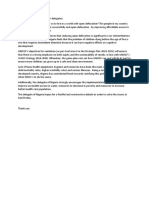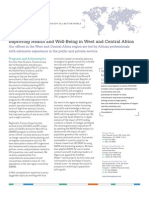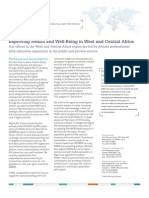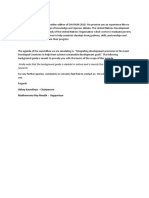UNICEF, ECCAS Join Forces For Children in Central Africa
UNICEF, ECCAS Join Forces For Children in Central Africa
Uploaded by
api-212683965Copyright:
Available Formats
UNICEF, ECCAS Join Forces For Children in Central Africa
UNICEF, ECCAS Join Forces For Children in Central Africa
Uploaded by
api-212683965Original Title
Copyright
Available Formats
Share this document
Did you find this document useful?
Is this content inappropriate?
Copyright:
Available Formats
UNICEF, ECCAS Join Forces For Children in Central Africa
UNICEF, ECCAS Join Forces For Children in Central Africa
Uploaded by
api-212683965Copyright:
Available Formats
UNICEF, ECCAS join forces for children in Central
Africa
LIBREVILLE/DAKAR, 29 February 2015 The Economic Community of Central
African States (ECCAS) and UNICEF signed a partnership today to work together
in promoting and supporting the survival and development of children across the
Central African region.
Through this agreement, both organizations are teaming up to advocate for
childrens rights through the formulation of policies and legislation aimed at
improving the well-being of children and women in a region which is affected by
growing vulnerabilities.
With the goal to gradually accelerate progress for the most vulnerable children
and mothers across ECCAS member states, UNICEF and ECCAS will develop a
plan of action that includes a set of programs in areas as vital as health and
HIV/AIDS, access to safe water, hygiene and sanitation, nutrition, child protection
and education in emergencies.
Saving more childrens lives across Central Africa is within our reach if all
countries work together, said Jacques Boyer, UNICEF Representative in Gabon.
It will take ambitious partnerships such as this one to ensure that the most
disadvantaged children in the region are prioritised in policy decisions being
taken today nothing less will be enough to stamp out child poverty.
With support from other partners and donors, this regional collaboration is
expected to progressively lead to tangible and positive results for children and
their families, including:
Stronger community-based health systems, with a special focus on health
in humanitarian emergencies and elimination of HIV transmission from
mother to child;
Increased investment and scaling up of interventions to reduce chronic
malnutrition among children under 5;
Improved access to safe drinking water and sanitation in rural areas,
including in emergency situations;
Enhanced civil registration systems and increased efforts in the fight
against child marriage and the protection of children in conflict.
Every social policy remains meaningless unless it focuses on womens and
childrens rights and well-being which lay the foundations for the future, said
Ahmad Allam-Mi, Secretary- General of the Economic Community of Central
African States. The strengthening of the cooperation between ECCAS and
UNICEF is the proof of our common willingness and commitment to promote
women and childrens rights.
The partnership will leverage UNICEFs expertise on childrens rights with the
ECCAS longstanding commitment to promote peace, prosperity and solidarity in
Central Africa. Both organizations will jointly develop and implement resource
mobilization strategies for the financing of the planned activities.
While significant economic and social advances are reported in Central Africa,
the region remains generally characterized by high rates of maternal and infant
mortality in many countries, high proportion of mothers, children and
adolescents living with HIV without antiretroviral treatment, low birth registration
rate, high prevalence of sexual violence and child marriages against girls, low
access to safe drinking water and sanitation and a high level of chronic
malnutrition in several countries.
About ECCAS
The main objective of ECCAS is to promote and strengthen a harmonious
co-operation and a dynamic, balanced and self- maintained development
in all fields of economic and social activity in central Africa.
About UNICEF
UNICEF promotes the rights and wellbeing of every child, in everything we do.
Together with our partners, we work in 190 countries and territories to translate
that commitment into practical action, focusing special effort on reaching the
most vulnerable and excluded children, to the benefit of all children, everywhere.
For more information about UNICEF and its work visit: www.unicef.org or follow
UNICEF on Facebook and Twitter.
For more information, please contact:
In Libreville: Brahim Ould Isselmou, UNICEF, +241 04 84 10 29,
boulisselmou@unicef.org
Placide Ibounaga-Ndinga, ECCAS, +241 44 47 31,
placide.ibounagandinga@gmail.com
In Dakar: Laurent Duvillier, +221 77 740 35 77, lduvillier@unicef.org
You might also like
- Biohack by Parth Goyal Class 11 2023Document244 pagesBiohack by Parth Goyal Class 11 2023Dhara Pandey86% (22)
- Millions Saved: New Cases of Proven Success in Global HealthFrom EverandMillions Saved: New Cases of Proven Success in Global HealthRating: 5 out of 5 stars5/5 (1)
- Understanding Smart Cities An Integrative FrameworDocument10 pagesUnderstanding Smart Cities An Integrative FrameworCarina AraujoNo ratings yet
- UNICEF Annual Report 2014Document64 pagesUNICEF Annual Report 2014unicef2014No ratings yet
- Situation Review of Children in ASEAN: For Every Child Health, Education, Equality, Protection Advance HumanityDocument32 pagesSituation Review of Children in ASEAN: For Every Child Health, Education, Equality, Protection Advance HumanitySofia Ann SantosNo ratings yet
- PIA ENG7 Unicef OrgDocument14 pagesPIA ENG7 Unicef OrgMiguel Acosta OlivoNo ratings yet
- UnicefDocument38 pagesUnicefMary Ann Pastolero Balatongle100% (2)
- Public Health Nutrition: Submitted By: Ishita Gupta ROLL NO: 1025/21 Post Graduate Diploma Nutrition and DieteticsDocument14 pagesPublic Health Nutrition: Submitted By: Ishita Gupta ROLL NO: 1025/21 Post Graduate Diploma Nutrition and DieteticsBarbie mendroliaNo ratings yet
- ESA Ministerial Commitment DTDocument18 pagesESA Ministerial Commitment DTKirito KazutoNo ratings yet
- United Nations Children FundsDocument8 pagesUnited Nations Children FundsKomaliNo ratings yet
- Trad 3Document3 pagesTrad 3merlinho.laclasseNo ratings yet
- The GLOBALIZATION OF WORLD REGIONDocument13 pagesThe GLOBALIZATION OF WORLD REGIONKristine San Luis PotencianoNo ratings yet
- UNICEF Sierra Leone Newsletter Sep 2013Document8 pagesUNICEF Sierra Leone Newsletter Sep 2013Rosmarie JahNo ratings yet
- Namibia 2015 COARDocument50 pagesNamibia 2015 COARKhushboo ParikhNo ratings yet
- UNICEF SpeechDocument1 pageUNICEF SpeechEdgar Bermudez100% (3)
- World Breastfeeding Week PR FinalDocument2 pagesWorld Breastfeeding Week PR FinaldewjiblogNo ratings yet
- Kenya Questions FinalDocument13 pagesKenya Questions Finalrossimaia35No ratings yet
- UNFPA ASSIGNMENT DoneDocument14 pagesUNFPA ASSIGNMENT DoneCovenant UbahNo ratings yet
- UNICEF Data and AnalyticsDocument22 pagesUNICEF Data and AnalyticsShubha JeniferNo ratings yet
- Goal: Eradicate Extreme Poverty and Hunger Targets by 2015Document8 pagesGoal: Eradicate Extreme Poverty and Hunger Targets by 2015Angel Louise T. OlfindoNo ratings yet
- Topic Background - UNICEF - AYIMUN VC 24-25 August 2024Document7 pagesTopic Background - UNICEF - AYIMUN VC 24-25 August 2024Afifah RezekiNo ratings yet
- News Note Statement: UNICEF, Nelson Mandela Foundation and Kick Off Appeal To Expand Schools For Africa InitiativeDocument2 pagesNews Note Statement: UNICEF, Nelson Mandela Foundation and Kick Off Appeal To Expand Schools For Africa Initiativeapi-212683965No ratings yet
- Honourable Chairs and Fellow DelegatesDocument1 pageHonourable Chairs and Fellow Delegatesusman noorNo ratings yet
- UNICEF Annual Report 2015Document60 pagesUNICEF Annual Report 2015UNICEFNo ratings yet
- CSOs AND THE FIGHT TO END CHILD MARRIAGE IN WEST AFRICADocument3 pagesCSOs AND THE FIGHT TO END CHILD MARRIAGE IN WEST AFRICAnana nyama dansoNo ratings yet
- Global Plan Elimination HIV Children by 2015Document48 pagesGlobal Plan Elimination HIV Children by 2015Newborn2013No ratings yet
- PEPFAR SG Application 2017final3Document17 pagesPEPFAR SG Application 2017final3miadjafar463No ratings yet
- Improving Health and Well-Being in West and Central AfricaDocument2 pagesImproving Health and Well-Being in West and Central AfricaFuturesGroup1No ratings yet
- UNFPADocument24 pagesUNFPADeepti KukretiNo ratings yet
- UNICEFDocument16 pagesUNICEFKrishnaveni MurugeshNo ratings yet
- Ngos Leading The Way On Sustainable Development GoalsDocument21 pagesNgos Leading The Way On Sustainable Development GoalsarifadiNo ratings yet
- ESA Commitment 7 December 2013Document8 pagesESA Commitment 7 December 2013Yemurai NyoniNo ratings yet
- Subm Study Indigenous Child Un Enti UnicefDocument12 pagesSubm Study Indigenous Child Un Enti Unicef72818927No ratings yet
- UNICEF Cameroon Annual Report 2015Document24 pagesUNICEF Cameroon Annual Report 2015Elodie N. BodoloNo ratings yet
- UnicefDocument5 pagesUnicefDeodatNo ratings yet
- Lesson 6 Children's Rights Case Study Hand OutDocument1 pageLesson 6 Children's Rights Case Study Hand OutLauren CavenderNo ratings yet
- UNAIDS Aids AwarenessDocument24 pagesUNAIDS Aids AwarenessMandy CampbellNo ratings yet
- UNICEF Annual Report 2017Document94 pagesUNICEF Annual Report 2017SBNo ratings yet
- Improving Health and Well-Being in West and Central AfricaDocument2 pagesImproving Health and Well-Being in West and Central AfricaFuturesGroup1No ratings yet
- Cover Letter For Nutrition Officer Position at UNICEFDocument1 pageCover Letter For Nutrition Officer Position at UNICEFHaitham Alak7alyNo ratings yet
- Victoria Environmental Conservation and Agricultural Organization (Vecao)Document6 pagesVictoria Environmental Conservation and Agricultural Organization (Vecao)Damn HommieNo ratings yet
- Unicef: The United Nations Children's FundDocument2 pagesUnicef: The United Nations Children's FundajapNo ratings yet
- Unicef Report 2013 ZimbabweDocument20 pagesUnicef Report 2013 ZimbabwejimmaloNo ratings yet
- DSWD Hiv Referral Book (1) Final and PublishedDocument98 pagesDSWD Hiv Referral Book (1) Final and PublishedRonz RoganNo ratings yet
- UNFPADocument4 pagesUNFPAAmna KhanNo ratings yet
- Edit ProposalDocument9 pagesEdit ProposalfuadzeyniNo ratings yet
- Dialogue Among NagriksDocument34 pagesDialogue Among Nagriksaavish.eramNo ratings yet
- UNICEF DRC - Factsheet On The Situation of Children in DRCDocument2 pagesUNICEF DRC - Factsheet On The Situation of Children in DRCUnicef RdCongoNo ratings yet
- Guide 2-Protecting Children's Lifes Against Violence and ExploitationDocument6 pagesGuide 2-Protecting Children's Lifes Against Violence and ExploitationGuillermo ReinosoNo ratings yet
- Working For An Equal Future - UNICEF Gender PolicyDocument17 pagesWorking For An Equal Future - UNICEF Gender PolicyShinyDharNo ratings yet
- Zamfara State School of Nursing and Midwifery, Gusau Department of Nursing Education Reproductive Health Iv Unit V: Hiv/Aids in ChildrenDocument3 pagesZamfara State School of Nursing and Midwifery, Gusau Department of Nursing Education Reproductive Health Iv Unit V: Hiv/Aids in ChildrenNusaibat jiboNo ratings yet
- CMD - Annual Report - 2023 Revised - Comments RemovedDocument30 pagesCMD - Annual Report - 2023 Revised - Comments RemovedkhamisconschristopherNo ratings yet
- U N oDocument16 pagesU N onabeelajavedNo ratings yet
- My Rights, My Voice Afghanistan Project OverviewDocument4 pagesMy Rights, My Voice Afghanistan Project OverviewOxfamNo ratings yet
- National Strategic Framework For HIV and AIDS Response in Namibia 2010/11 - 2015/16Document144 pagesNational Strategic Framework For HIV and AIDS Response in Namibia 2010/11 - 2015/16Laura Lopez GonzalezNo ratings yet
- Prove That The Current Status Quo Is Working. A. Provide Programs of The Govt That Addresses Related Social ProblemsDocument5 pagesProve That The Current Status Quo Is Working. A. Provide Programs of The Govt That Addresses Related Social ProblemsDyniseBautistaCuevasNo ratings yet
- Untitleddocument 1Document2 pagesUntitleddocument 1api-349666659No ratings yet
- HIV and AIDS and MunicipalitiesDocument22 pagesHIV and AIDS and MunicipalitiesSammyNo ratings yet
- Twinning Center: HealthcareDocument23 pagesTwinning Center: HealthcareKatongo MutaleNo ratings yet
- Ecd BrochureDocument2 pagesEcd BrochureManesha KentNo ratings yet
- Research.: Abhay Kaundinya - Chairperson Madhureema Roy Moulik - RapporteurDocument10 pagesResearch.: Abhay Kaundinya - Chairperson Madhureema Roy Moulik - RapporteurMadhureema RoyMoulikNo ratings yet
- News NoteDocument2 pagesNews Noteapi-212683965No ratings yet
- News NoteDocument2 pagesNews Noteapi-212683965No ratings yet
- News Note: Schools in Liberia To Reopen Following Return of More Than 1 Million Students in GuineaDocument2 pagesNews Note: Schools in Liberia To Reopen Following Return of More Than 1 Million Students in Guineaapi-212683965No ratings yet
- News Note: Schools in Liberia To Reopen Following Return of More Than 1 Million Students in GuineaDocument2 pagesNews Note: Schools in Liberia To Reopen Following Return of More Than 1 Million Students in Guineaapi-212683965No ratings yet
- Mali Envisions Being Out of The Group of 28 Countries That Have Not Yet Eliminated TetanusDocument2 pagesMali Envisions Being Out of The Group of 28 Countries That Have Not Yet Eliminated Tetanusapi-212683965No ratings yet
- Press Release: Lack of Toilets Dangerous For Everyone, UNICEF SaysDocument2 pagesPress Release: Lack of Toilets Dangerous For Everyone, UNICEF Saysapi-212683965No ratings yet
- Press Release: Steep Drop in Pneumonia Deaths in Last Decade, But Much Further To Go - UNICEFDocument2 pagesPress Release: Steep Drop in Pneumonia Deaths in Last Decade, But Much Further To Go - UNICEFapi-212683965No ratings yet
- News Note Statement: UNICEF, Nelson Mandela Foundation and Kick Off Appeal To Expand Schools For Africa InitiativeDocument2 pagesNews Note Statement: UNICEF, Nelson Mandela Foundation and Kick Off Appeal To Expand Schools For Africa Initiativeapi-212683965No ratings yet
- Press Release: Conflict Creating Unprecedented Threats To Children's LivesDocument2 pagesPress Release: Conflict Creating Unprecedented Threats To Children's Livesapi-212683965No ratings yet
- Press Release: UNICEF Flies Emergency Aid To Conflict-Stricken Central African RepublicDocument2 pagesPress Release: UNICEF Flies Emergency Aid To Conflict-Stricken Central African Republicapi-212683965No ratings yet
- 18DCS068 3-4Document16 pages18DCS068 3-4Harsh PatelNo ratings yet
- An Intro To Git and GitHub For Beginners (Tutorial)Document28 pagesAn Intro To Git and GitHub For Beginners (Tutorial)anupam20099100% (1)
- Seed Dispersal Methods PosterDocument1 pageSeed Dispersal Methods Posterasmigujar3105No ratings yet
- SJ-20121119144002-004-ZXSDR BS8912 U2100 (HV1.0) Hardware Installation PDFDocument51 pagesSJ-20121119144002-004-ZXSDR BS8912 U2100 (HV1.0) Hardware Installation PDFSoar ReyNo ratings yet
- Grammar: Adverbs (Manner and Modifiers)Document3 pagesGrammar: Adverbs (Manner and Modifiers)EVELYN VERONICA HERRERA AVENDAÑO100% (3)
- Uber Digital BusinessDocument5 pagesUber Digital BusinessDevansh RaiNo ratings yet
- Bedaquiline-Pretomanid-Linezolid Regimens For Drug-Resistant Tuberculosis 2022Document14 pagesBedaquiline-Pretomanid-Linezolid Regimens For Drug-Resistant Tuberculosis 2022awaluddin andyNo ratings yet
- Philippine Literature (Story)Document76 pagesPhilippine Literature (Story)Ro Lai Yah BerbañoNo ratings yet
- South Korea at The Crossroads - Autonomy and Alliance in An - Scott A - Snyder - 2018 - Columbia University Press - 9780231546188 - Anna's ArchiveDocument371 pagesSouth Korea at The Crossroads - Autonomy and Alliance in An - Scott A - Snyder - 2018 - Columbia University Press - 9780231546188 - Anna's ArchiveThaisa VianaNo ratings yet
- Anetic Aid Newsletter - Oct 07Document4 pagesAnetic Aid Newsletter - Oct 07serwis dolmedNo ratings yet
- George (Culhi) Hambon, Petitioner, vs. Court of Appeals and VALENTINO U. CARANTES, RespondentsDocument7 pagesGeorge (Culhi) Hambon, Petitioner, vs. Court of Appeals and VALENTINO U. CARANTES, RespondentsAM CruzNo ratings yet
- Narrative Text Concept MapDocument2 pagesNarrative Text Concept MapScribdTranslationsNo ratings yet
- Summer Training PresentationDocument22 pagesSummer Training PresentationAreeb SirajNo ratings yet
- Islam Southeastasia 2019Document115 pagesIslam Southeastasia 2019Chesca AguaNo ratings yet
- COMEDK UGET 2013 Engineering Colleges Cutoffs - COMEDK UGET 2013 Opening and Closing RanksDocument4 pagesCOMEDK UGET 2013 Engineering Colleges Cutoffs - COMEDK UGET 2013 Opening and Closing RanksLohith_EnggNo ratings yet
- Assingment 1 - Professional Ethics - EditedDocument6 pagesAssingment 1 - Professional Ethics - EditedSiranjana RodrigoNo ratings yet
- Amos Ariny Astronomer DART MissionDocument19 pagesAmos Ariny Astronomer DART MissionDr. Amos ArinyNo ratings yet
- Uni 2Document2 pagesUni 2Sergio Almagro Valverde100% (1)
- Chemistry Project Class 12Document15 pagesChemistry Project Class 12Saish ParkarNo ratings yet
- Bread of SaltDocument2 pagesBread of SaltEduardo GarciaNo ratings yet
- Afcat Application Form: Indian Air ForceDocument3 pagesAfcat Application Form: Indian Air ForceAkash 16No ratings yet
- Tianjin Zhongwang ProfileDocument42 pagesTianjin Zhongwang ProfileRaul CochranNo ratings yet
- Geneational Poveritdy RevisedDocument5 pagesGeneational Poveritdy Revisedapi-238735338No ratings yet
- Solution-Case StudyDocument26 pagesSolution-Case Studyzangzop5No ratings yet
- The Merman and The Book of PowerDocument58 pagesThe Merman and The Book of PowerAtif HayatNo ratings yet
- Employment Notification No. CMRL HR CON DEP 11 2023 Website FinalDocument4 pagesEmployment Notification No. CMRL HR CON DEP 11 2023 Website FinalSakthiNo ratings yet
- C&M StandardGears PDFDocument13 pagesC&M StandardGears PDFlitonNo ratings yet
- MRK - Spring 2021 - MCM516 - 1 - MC190400697Document2 pagesMRK - Spring 2021 - MCM516 - 1 - MC190400697Tauseef HassanNo ratings yet


































































































